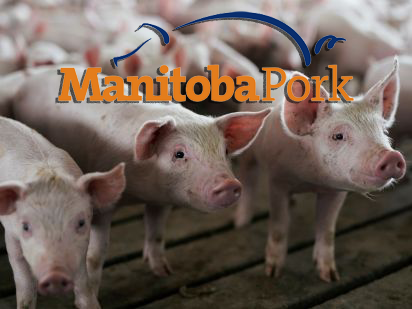Manitoba pork producers keep a close eye on U.S. legislation

Pork producers in the province are watching closely as legislation set to come into effect across the border in the coming months could lead to costly renovations and a breakdown of trade networks
CBC News
A California animal cruelty law that sets out the minimum amount of space farmers must give to cows, pigs and chickens in confinement was upheld by the U.S. Supreme Court in mid-May.
The 2018 law, called Proposition 12, stipulates that pork sold in the state must come from pigs whose mothers were raised with at least 24 square feet of space and the ability to lie down and turn around.
Animal rights groups said Proposition 12 was needed to prevent mother pigs being locked in “gestation crates” or “gestation stalls” that are barely larger than the animals’ bodies. The Humane Society of the United States, an animal rights group that backed Proposition 12, wrote in a blog post in May that under current standards in the meat and egg industries, many animals are confined in cages so small they can barely move.
“At the end of the day, a delay of game is good, but if there’s no balanced approach to all of this, it’ll be really negative for producers”These rules were originally supposed to be implemented in July, but that was delayed until Jan. 1 earlier this week.
A Manitoba pork producer says that could raise concerns here.
“The sector right now isn’t doing well as it stands,” said Rick Bergmann, a pork producer in the Steinbach area. “So it’ll be very difficult, I believe, for both countries, the U.S. and Canada, to align with some of these standards that have been brought forward.”
Bergmann said while the delay in implementation of the legislation is helpful, he’s concerned about how farms will adapt to what he called a “moving target.” It’s not the same for everyone, but it “can easily cost over a million dollars” for a farm built in the early 2000s to adapt to the law, he said.
Some of his neighbours will have to make renovations or go out of production, he said.
“Canada is a small piece of the pie, but when the domino falls there, the dominoes will fall over here,” he said.
“That’s something we just have to understand and see where it goes, because it’s, again, a very costly renovation to comply with this.”
Impact on trade
Others in the province are worried that if other states in the U.S. introduce their own legislation, it will break down the integrated market that allows free trade between the two countries.
Cam Dahl, the general manager of Manitoba Pork, explained that Canada and the U.S. have built a trade agreement based on the acceptance of each other’s food, safety, environmental and animal welfare standards. Legislation like Proposition 12 is beginning to erode a market that’s good for both consumers and producers, he said.
“We negotiated a trade agreement with the United States of America and we didn’t negotiate an agreement with 50 individual states,” he said. “We need to see that unified, integrated market preserved.”
Manitoba Pork general manager Cam Dahl worries that as individual states in the U.S. introduce their own legislation, it will break down the integrated market that allows free trade with Canada. (Submitted by Joey Dearborn/Manitoba Pork)
Manitoba sends about three million pigs to the U.S. each year, Dahl said.
“I’m concerned that it’s a larger trend forward towards protectionism,” he said. “As a country, we depend on trade. Agriculture depends on trade.”
Kevin Grier, a livestock analyst based in Guelph, Ont., said producers who are in tough financial positions or who are considering how long they want to remain in the industry might feel expensive renovations aren’t worth it.
“That would, like I say, tip the scales for many producers,” he said.
Balanced approach
Dahl said the long-term outlook in Manitoba remains strong, however, and the pork sector continues to be important to the province.
Bergmann hopes a consistent approach can be found before the end of the year.
“At the end of the day, though, a delay of game is good,” he said. “But if there’s no balanced approach to all of this, it’ll be really negative for producers.”













